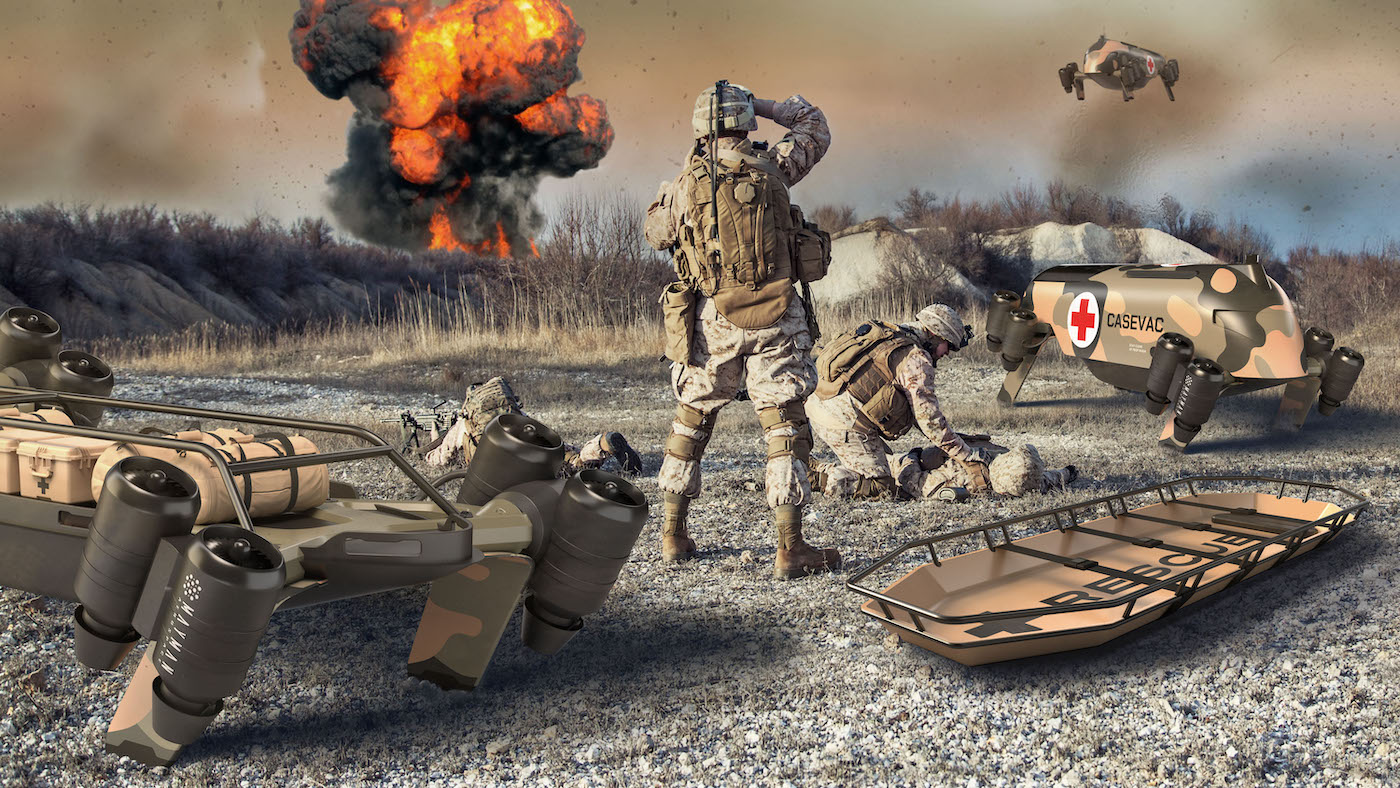The United Arab Emirates’ Strategic Development Fund is investing $3 million in Mayman Aerospace’s plans to bring the remotely piloted Speeder VTOL aircraft to market. The capital injection announced on February 22 is the latest investment in the advanced air mobility sector by the venture capital arm of the Tawazun Council, which oversees the Gulf state’s sovereign wealth fund.
The full-scale P2 turbine-powered model, which Mayman refers to as an air utility vehicle, is expected to have a 1,000-pound payload. The company believes it will be able to fly up to 400 miles at over 500 mph and be used for a variety of applications, including cargo deliveries and military logistics. The California-based start-up said that the new funding from the UAE will support the Speeder’s ongoing flight test campaign as it aims for FAA-type certification in 2024, and also wider product development of new versions of the vehicle aimed initially at military applications.
NEW SPEEDER MICRO PREPARES TO FLY
The company is now working on a smaller version of the vehicle called the Micro, which it says is "considerably smaller" than the P2 model. The exact size and specifications for the Micro have not been disclosed, but founder and CEO David Mayman told FutureFlight it will deliver speed and range that is currently unachievable by comparably sized rotor drones. According to Mayman, defense export customers are showing interest in the Speeder Micro as a compact, high-performance vehicle that could use used as a target drone or for counter uncrewed aircraft systems roles.
Once the company secures FAA experimental approval or a suitable exempt military facility, it intends to start high-speed, untethered test flights with the new version. Mayman Aerospace, which is part of the JetPack Aviation group, started tethered flight testing with the first full-scale prototype in May 2021.
SDF is exploring the potential to set up a manufacturing center to build the Speeder in Abu Dhabi for distribution in the Middle East and North Africa region. “As part of our strategic mandate, we look forward to exploring and developing synergies through our portfolio of related investments and partnerships in aerospace, defense, and autonomous sectors that would potentially support the development of a family of primarily defense-focused Speeder air utility vehicles,” said Mohamed Musabah Al Mazrouei, the UAE group’s director of investments and portfolio management.
In the short term, Mayman Aerospace's priority is to achieve military certification for the Speeder. "FAA-type certification for civilian applications remains a significant but more long-term goal as basic rules and infrastructure for heavy fuel-powered compact VTOL aircraft are still in the very early stage of formulation," Mayman explained.
Last year, Mayman confirmed that it is reviewing plans for international joint manufacturing agreements and will submit an application to comply with the U.S. International Traffic in Arms Regulations for exporting military-use products. In 2021, the U.S. Air Force and U.S. Special Operations Command selected the Speeder to take part in the High-Speed VTOL (HSVTOL) Concept Challenge organized by the Afwerx unit to evaluate options for military missions. It also holds letters of intent for 25 of the vehicles from its Swedish distributor, Savback Helicopters.
One potential civil application for the Speeder is what the manufacturer describes as port-to-port deliveries of bulk commercial parcels. It says the vehicle could quickly climb to 10,000 feet, where the noise of its engine would not cause a ground disturbance, then cruise at 500 mph before descending quickly to make deliveries.
Under this scenario, the company says the Speeder could deliver blood samples from New York City to Boston in 30 minutes or critical electronic parts from London to Paris in 25 minutes. "Speeder would turn parcel delivery expectations on their head," commented Mayman.
SPEEDER CARGO AND ENDURANCE MODELS IN THE WORKS
Beyond what Mayman describes as the current "mid-size" Speeder P2 vehicle, Mayman sees scope for a larger Speeder Cargo Class model in addition to the entry-level Micro. The company has not yet disclosed projected specifications for the Cargo Class vehicle.
Also in the works with the company's research and development team is a completely new aircraft referred to as the Speeder Endurance Class. Mayman told FutureFlight that this will offer similar payload and range to its Speeder siblings while being able to fly, "for several hours with a very unique propulsion system."
The current vehicle is being designed and manufactured in the U.S. and uses commercial off-the-shelf turbine engines that will run on jet-A or sustainable aviation fuel. Mayman is working with Prometheus Fuels to explore the potential use of its Titan Fuel Forge technology to produce zero-carbon fuel to power the Speeder's engines. The Titan process will "make fuel from air" by reclaiming atmospheric carbon through a proprietary process that strips carbon dioxide molecules from the air and "energizes" them into hydrocarbons that can be made into any type of fuel.
“The optimization of Speeder’s existing propulsion control system, which can be adapted to future technologies, combined with its flexible operating capabilities, influenced our decision to invest,” Al Mazrouei commented.












0 Comments